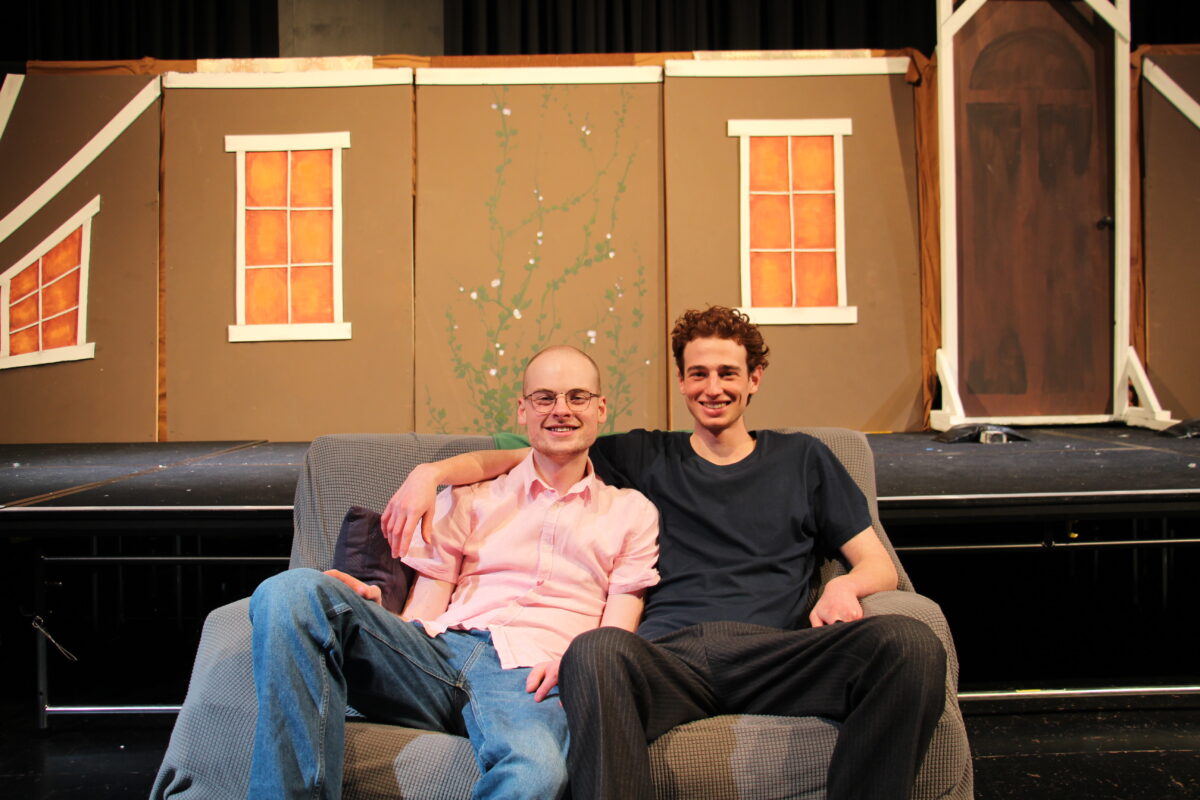Easily the bravest choice of NUTS’ 2024 season was their first ever full length student-written play, Third Storey, written and directed by Eli Narev and Adam Gottschalk (pictured above). We had little to no expectations walking into this show, and upon leaving could only describe it as “on crack, but in the best way.”
Third Storey follows prank influencers Jax and Gene, who have been awarded a grant to make a feature film. The play follows the chaos of their creative process as characters slowly stray from sanity in their attempts to adapt Franz Kafka’s Metamorphosis into a one-woman motion picture. Locked in a three storey house, the script explores complex systems of rules, family dynamics, the hunger for perfection, and an attic full of possum shit.
The original script was witty, deeply funny, heart warming and often unexpected. Narev and Gottschalk should be commended on the multi-faceted nature of the characters they created, building an ensemble of individuals easily recognisable to a modern audience. Many of the script’s most tender moments occurred between Annabelle Hansen’s Judie and Beth Fuccilli’s Bev, where the writing touched on some of the difficulties of parenting, questioning to what extent we are all impacted by the choices our parents make. A standout writing and directorial moment in the first act came from an attempt by director-character Jax (played by Adelaide Hayes) to shoot the one-woman scene sequentially one line at a time. As the characters scrambled to perform quick changes, the comedic direction of Elizabeth Barnes’ Alison counting down by ones each time she switched personas had the audience dissolving into laughter.
While the script was excellent overall, it could have potentially benefited from further editing. The production — especially the first act — felt overlong at times. This length can be attributed to attempts to give too many characters tragic backstories, which were at times rushed, and lengthy duologues that could have been shortened or cut.
Turning now to the cast, both of our stand-out performances came from Fuccilli and Mischa Rippon as Bev and Graham, the loveable, stereotypical Aussie parents. The moment they stepped on stage they brought a refreshing lightness that cut through the length of Act One, being comedic, touching, and most importantly giving a sense of humanity to the show. The pair’s talent was further highlighted in the dramatic twist at the conclusion of the show, where despite blood pooling from his mouth Rippon, with stoic determination, refused to break character, whilst Fuccilli continued to movingly comfort her husband.
Paralleling their parents’ dynamics, the sibling duo of Hayes’ Jax and Callum Doherty’s Gene highlighted the range of these actors. In particular, Doherty’s raw, haunted expression at the end of Act Two silenced the audience. Another actor of note was Thomas Neil in his portrayal as the dorky, golden retriever boyfriend Dom who arguably had one of the more significant character developments throughout, emphasising Neil’s versatility as an actor. However other characters, like Pip and the Producer, felt a little rushed and underdeveloped.
An unconventional inclusion for this production was an original garment from Bridget Matison who created a one-of-a-kind cockroach inspired showgirl costume. This bold choice highlighted the eccentricity of the film being created, enhancing Barnes’ dramatic interpretation of Kafka’s Gregor as a cockroach. Additionally, the evening wear used for the award show scenes provided contrast to the otherwise ordinary costumes used throughout the rest of the show. Overall, the costume design led by Lara Connolly was cohesive and enhanced the portrayal of each of the characters.
The set for this production was exceptional. Credit must be given to set designer Katja Curtin and assistant set designer Grace Fletcher who managed to transform Kambri drama theatre into a convincing family home. There were two major sets, the first being the exterior of the house, with well-executed painting of black flats making the set look three-dimensional. The second set displayed the interior of the home, utilising a raised stage to highlight two of the three storeys. The set was further enhanced by the cohesion of the actors’ entrances and exits, at times circling behind the stage to illustrate the journey of travelling to the second floor. Furnished with effective props, this set is certainly a stand-out from the sets we have seen in Kambri this year.
Unfortunately, during the blackouts where set and numerous prop changes occurred the backstage crew moved at what felt like a glacial pace, with a lack of transition music, forcing the audience to hone in on the movements of the crew. Where the script was already long, this elongated the show further.
The lighting design by Jessica Peacock was effective, using spotlights and blackouts where necessary for the script. Whilst at times slightly delayed — Kambri lighting is notoriously unreliable — more creative lighting may have enhanced the script. An inclusion we might suggest would be varying the lighting when the camera was rolling to dramatically differentiate. Further, Genevieve Cox’s sound design was apt for purpose and well-timed.
Neither of us were quite prepared for the dramatic twist at the denouement of this production. All we can say from that ending for those who did not get to see the show is…remember to feed your dad. Overall, the show proved an immense success and we are excited to see what is next for the witty writing duo of Narev and Gottschalk.
We acknowledge the Ngunnawal and Ngambri people, who are the Traditional Custodians of the land on which Woroni, Woroni Radio and Woroni TV are created, edited, published, printed and distributed. We pay our respects to Elders past and present. We acknowledge that the name Woroni was taken from the Wadi Wadi Nation without permission, and we are striving to do better for future reconciliation.
